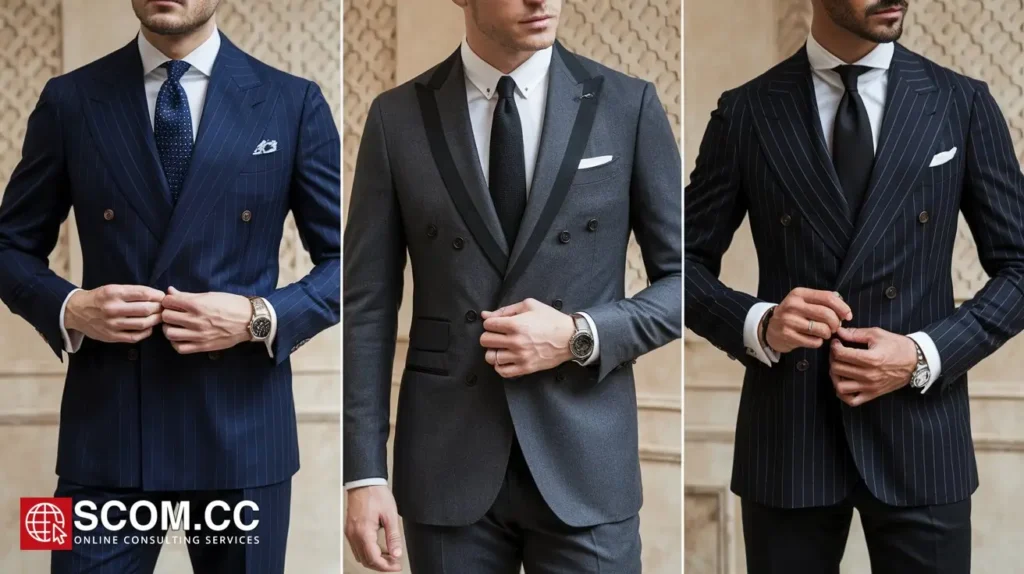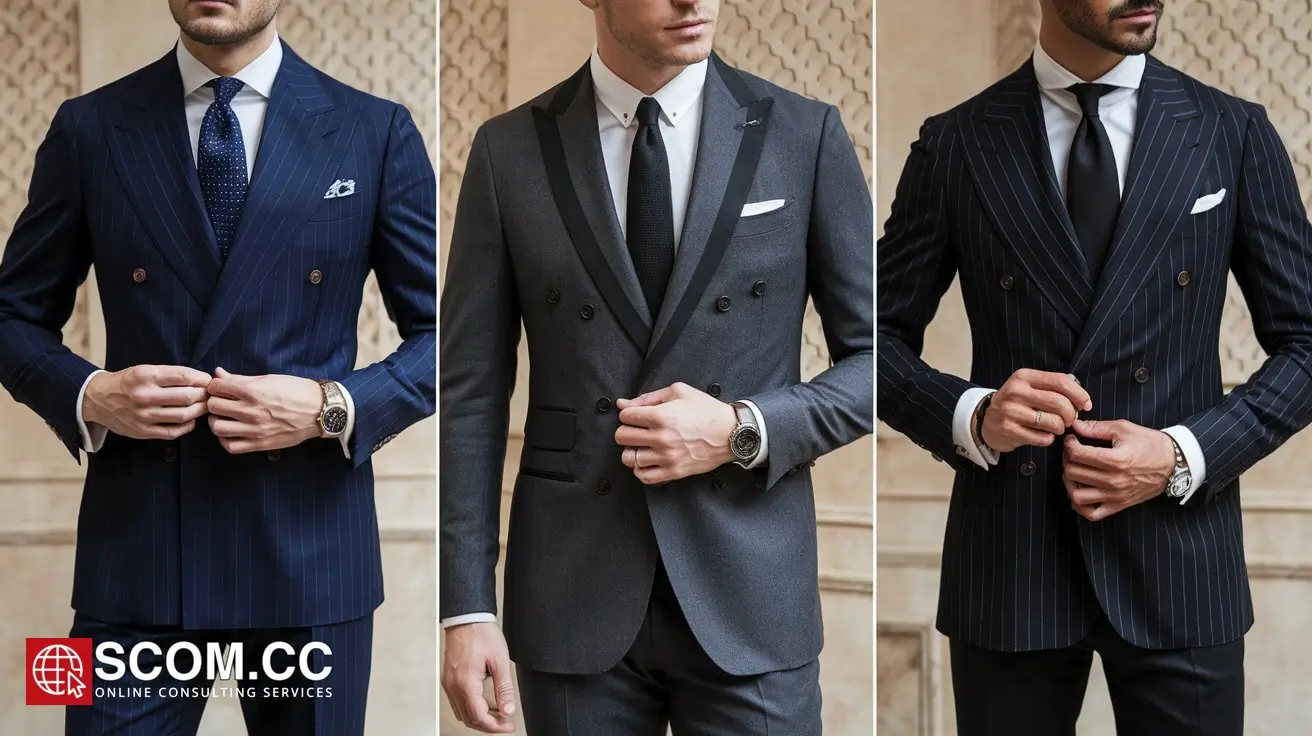Selecting the Perfect Fabric: Wool, Linen, or Cotton?

- Selecting the Perfect Fabric: Wool, Linen, or Cotton?
- Wool: The Classic Choice
- Linen: The Lightweight and Breathable Option
- Cotton: The Casual and Versatile Fabric
- Conclusion: Making the Right Choice
-
Frequently Asked Questions
- 1. What is the best fabric for a formal business suit?
- 2. How should I care for a linen suit to keep it looking fresh?
- 3. Are cotton suits suitable for colder weather?
- 4. How often should I dry clean a wool suit?
- 5. Can linen suits be worn to formal events?
- 6. What are the main advantages of choosing a wool suit?
- 7. How can I reduce wrinkles in a cotton suit?
Selecting the Perfect Fabric: Wool, Linen, or Cotton?
Choosing the right fabric for a suit or other formal wear is crucial to achieving both style and comfort. The fabric you select will impact not only the look and feel of your garment but also its suitability for different occasions and climates. This comprehensive guide explores the three primary fabric options—wool, linen, and cotton—to help you make an informed decision and select the perfect fabric for your needs.
Wool: The Classic Choice
Why Choose Wool?
Wool is often regarded as the quintessential fabric for suits due to its versatility, durability, and elegance. Its natural properties make it an excellent choice for a wide range of settings, from formal business meetings to special occasions.
Types of Wool
- Merino Wool: Known for its softness and fine texture, Merino wool is highly breathable and comfortable against the skin. It is often used in high-quality suits and provides a luxurious feel.
- Tweed: This is a heavier wool variant known for its durability and warmth. Tweed suits are ideal for colder climates and offer a classic, rugged look.
- Flannel: Flannel wool is brushed to create a softer, warmer texture, making it suitable for fall and winter suits.
Benefits of Wool
- Breathability: Wool naturally regulates temperature and absorbs moisture, keeping you comfortable in varying conditions.
- Wrinkle Resistance: Wool's natural elasticity helps it retain its shape and resist wrinkles, ensuring a polished appearance throughout the day.
- Versatility: Available in various weights and weaves, wool can be tailored to different occasions and climates.
Care and Maintenance
Wool suits should be dry cleaned regularly to maintain their appearance. Store them on wooden hangers and use a suit bag to protect against dust and light damage.
Linen: The Lightweight and Breathable Option
Why Choose Linen?
Linen is renowned for its lightweight, breathable, and textured qualities, making it an ideal choice for warm climates and casual events. It exudes a relaxed and effortlessly stylish look.
Benefits of Linen
- Breathability: Linen’s loose weave allows air to circulate freely, keeping you cool and comfortable in hot weather.
- Natural Look: The inherent wrinkles and creases of linen contribute to its relaxed, casual aesthetic, adding character to the garment.
- Lightweight: Linen is significantly lighter than wool or cotton, making it perfect for summer and tropical climates.
Drawbacks of Linen
- Wrinkle Prone: Linen wrinkles easily, and its crumpled look may not be suitable for formal or professional settings.
- Durability: Linen can be less durable compared to wool and may wear out more quickly with frequent use.
Care and Maintenance
Linen garments require careful handling. Iron them while damp to reduce wrinkles and maintain their crisp look. Dry clean or hand wash with mild detergent, and ensure thorough drying to prevent mildew.
Cotton: The Casual and Versatile Fabric
Why Choose Cotton?
Cotton is appreciated for its comfort, softness, and affordability. It offers a more relaxed alternative to wool and linen, making it suitable for both casual and semi-formal occasions.
Types of Cotton
- Poplin: A tightly woven fabric that is smooth and durable. Poplin cotton suits are perfect for everyday wear and business casual settings.
- Twill: Known for its diagonal weave, twill cotton is softer and has a bit of sheen, providing a more refined look.
Benefits of Cotton
- Comfort: Cotton is soft and breathable, making it comfortable to wear throughout the day.
- Affordability: Generally more cost-effective than wool or linen, cotton suits offer a good balance between quality and price.
- Easy Maintenance: Cotton can be machine washed and ironed easily, making it a low-maintenance option.
Drawbacks of Cotton
- Wrinkle Prone: Cotton wrinkles more easily than wool and may require frequent ironing to maintain a smooth appearance.
- Less Formal: Cotton suits are generally seen as less formal compared to wool, and may not be appropriate for very formal occasions.
Care and Maintenance
Cotton suits can be washed in a machine, though it is best to follow the care label instructions. Iron them while slightly damp to remove wrinkles, and store them on a proper hanger to maintain shape.
Conclusion: Making the Right Choice
Selecting the perfect fabric for your suit depends on various factors including the occasion, climate, and personal style. Wool offers versatility and elegance for a wide range of settings, linen excels in hot weather with its breathable and relaxed nature, and cotton provides comfort and affordability for casual and semi-formal wear.
By understanding the benefits and drawbacks of each fabric, you can make a more informed decision and choose a suit that meets your needs and preferences. Whether you opt for the classic elegance of wool, the breezy comfort of linen, or the casual versatility of cotton, the right fabric will ensure that your suit performs well and looks great.
Fabric Comparison Table
| Fabric | Benefits | Drawbacks | Best For | Care Tips |
|---|---|---|---|---|
| Wool | - Versatile - Breathable - Wrinkle resistant | - Can be pricey - Requires dry cleaning | - Formal occasions - Business settings - Varied climates | - Dry clean regularly - Store on wooden hangers - Use a suit bag |
| Linen | - Lightweight - Breathable - Relaxed, natural look | - Wrinkle prone - Less durable | - Hot climates - Casual settings | - Iron while damp - Hand wash or dry clean - Ensure thorough drying |
| Cotton | - Comfortable - Affordable - Easy maintenance | - Wrinkle prone - Less formal | - Casual wear - Semi-formal occasions | - Machine wash - Iron while damp - Store on proper hanger |
Frequently Asked Questions
1. What is the best fabric for a formal business suit?
Wool is generally considered the best fabric for formal business suits due to its versatility, elegance, and ability to maintain a crisp appearance throughout the day. It offers a refined look suitable for various professional settings.
2. How should I care for a linen suit to keep it looking fresh?
To care for a linen suit, iron it while it is slightly damp to minimize wrinkles. Additionally, consider hand washing or dry cleaning and ensure the suit is thoroughly dried to prevent mildew.
3. Are cotton suits suitable for colder weather?
Cotton suits are not ideal for colder weather as they do not provide the warmth and insulation required. For colder climates, wool or wool blends are more appropriate due to their thermal properties.
4. How often should I dry clean a wool suit?
Wool suits should be dry cleaned as needed, generally after several wears or if they become visibly soiled. Frequent dry cleaning can weaken the fabric, so it’s best to clean the suit only when necessary.
5. Can linen suits be worn to formal events?
Linen suits are typically considered too casual for formal events due to their relaxed appearance and tendency to wrinkle. They are better suited for casual or semi-formal settings, especially in warm climates.
6. What are the main advantages of choosing a wool suit?
The main advantages of wool suits include their versatility, breathability, wrinkle resistance, and overall durability. Wool suits can be adapted for various occasions and climates, making them a timeless choice.
7. How can I reduce wrinkles in a cotton suit?
To reduce wrinkles in a cotton suit, iron it while it is slightly damp or use a steamer. Cotton suits are prone to wrinkles, so regular ironing and proper storage on a hanger are essential for maintaining a smooth appearance.

To explore more about tailoring, visit our Blog of Tailoring. If you have any questions or need assistance, go to our contact page. Additionally, you can find more information about tailoring and consulting at this tailoring and consulting portal.

Leave a Reply